Recent Activity

I think that Deanna is the only gardener.

@NHBabs z4b-5a NH Still have the same question. The fact that the Dianthus went downhill together with a nearby tree seems like an important clue to a bigger story.

Both products - compost and bark - will retain moisture at the soil surface. Actually, ANY organic mulch will do the same. The difference comes with the moisture content of the product itself. Because of the source and the chemical composition, bark mulches are dry. In fact, other than fresh arborist's wood chips, all wood based mulches are quite dry.
OTOH, compost is wet. Even finished compost is around 45% water and active but unfinished compost can be as much as 60%.
This is easily confirmed by their relative weights. Compost is wet and heavy and weighs around 1250 lb/cubic yard. Bark and most other wood mulches are dryer and lighter, at somewhere around 500-800 lb/cubic yard.

As I see it the problem here is rabbit holes and wild geese. Without knowing a single thing about OP's soil and what's planted in it, several wild geese have been chased down rabbit holes.

A lot of us garden intuitively, westes. I might test my soil if I had problems, but I generally observe my plants and alter their care according to the way they falter. Soil tests are interesting and informative, but certainly not mandatory. A plant that doesn't like it moist is not going to like a moist mulch---no matter the soil underneath.
Charles Kidder, I can't imagine any climate where a compost mulch couldn't be recommended. People nowadays don't seem to know about using compost as a mulch, because in the 70s all of a sudden everybody embraced the wood industry's successful marketing of wood chip mulches, resulting in a total hijacking of the term 'mulch'. I never saw that fast food style wood mulch until I actually saw my first MacDonalds. When I was a kid, my father (who came from hot Oklahoma) called our compost pile the 'mulch' pile.
I do think wood chip mulches are fine if you can't get compost---better than a stick in the eye.

An end nipper
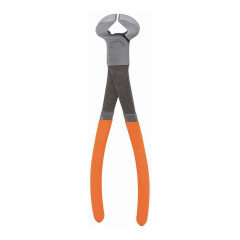
is different than a concave branch cutter; however, there are tools used for working on trees which resemble the end nippers. Those would be branch/trunk splitters:
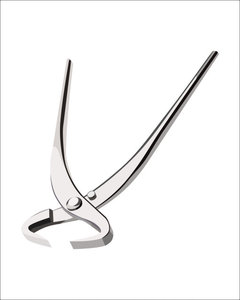
and root cutters:

When using wood glue to seal a wound, are you expecting that to eventually just fall off as the wound hardens? In the case of the ponytail, the glue will harden and the callus tissue which arises from the cambial layer. There will still be a small indentation after callus completely covers the wound, but as noted, the would will be much smaller than it would be if left untreated.
Does it make sense to coat the wound with sulfur powder before applying the glue?
I have never used sulfur powder on wounds for 2 reasons, The first is, I'm primarily dealing with woody plants and it isn't necessary. Second, I don't know how the sulfur would affect the glue's adherence or the integrity/ durability of the glue itself, so I can't say. I use it very regularly though, on succulents whenever I prune anything larger than pencil thick branches, and I haven't had a problem. If you decide to adopt he practice and use sulfur powder, let us know how it works.
There is a product specifically designed to cover wounds on small trees. It's called cut paste and comes in a consistency about like modeling clay or a paste a little thicker than toothpaste. Like wood glue, it is designed to prevent desiccation of viable wood surrounding the wound and to keep insects out.
Al

You are not planting food producing anything, including grapes, in the shade of those larger trees. It isn’t the rhodies that are making things dark. Rhodies are understory shrubs, and enjoy the shade of those trees. Food crops need blazing full sun.

Step one should be to find an aesthetic pruner (a good one) and try to shape the form to open up the space. If that still fails to give you the view you want, then I might spend a year trying to find an organization that would pay to have them moved. Those are too nice to just kill off.

Our county offers compost, fine mulch and more coarse mulch at very low price . We mostly buy fine mulch as mulch for the beds. They provide good barrier and water protection but also decompose relatively fast. We apply it every spring

@mazerolm_3a Any kind of bulb plant is going to just laugh at a 4-inch mulch layer and then pop right through. I have a raised bed with about 12 inches of succulent soil on top of the clay loam soil, which holds sever bulbs. The bulbs worked their way all through that soil and pop up reliably every Spring. Bulb plants tend to be persistent and aggressive in playing out their bloom cycle.

I have been following this thread because I have a threadleaf cypress, a Chamaecyparis, dwarf variety. I am learning much from the discussion about soil and amendments.
Wastes, it may be shocked a bit, but doesn’t look too bad. I am no expert, but I imagine time will tell. Hope it settles in nicely for you.
debra

So the Coleonema I transplanted is dying. It is slowly browning out all the stems. I joined a South African gardening group, and several people there told me this genus is known to be very difficult to transplant. One person told me she transplanted three at the same time and only one survived.
I guess for the future I need to be very concerned about taking a root ball of original soil out with the plant. It's not okay to bare root the plant, even if you hydrate the roots for an hour in a tub of water before replanting.




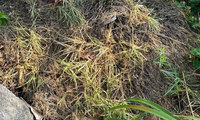
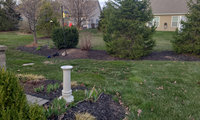


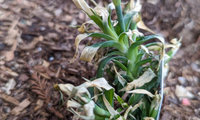

A mulch is probably a great idea, especially if it is at least two or three inches thick. I use composted bark for my mulch, and I find if I poke a finger down to the soil level it is often very cool down there, even when our daytime temperature is over 80F. As I understand it Delphinium wants cool Summer conditions.
Certainly no reason not to mulch.